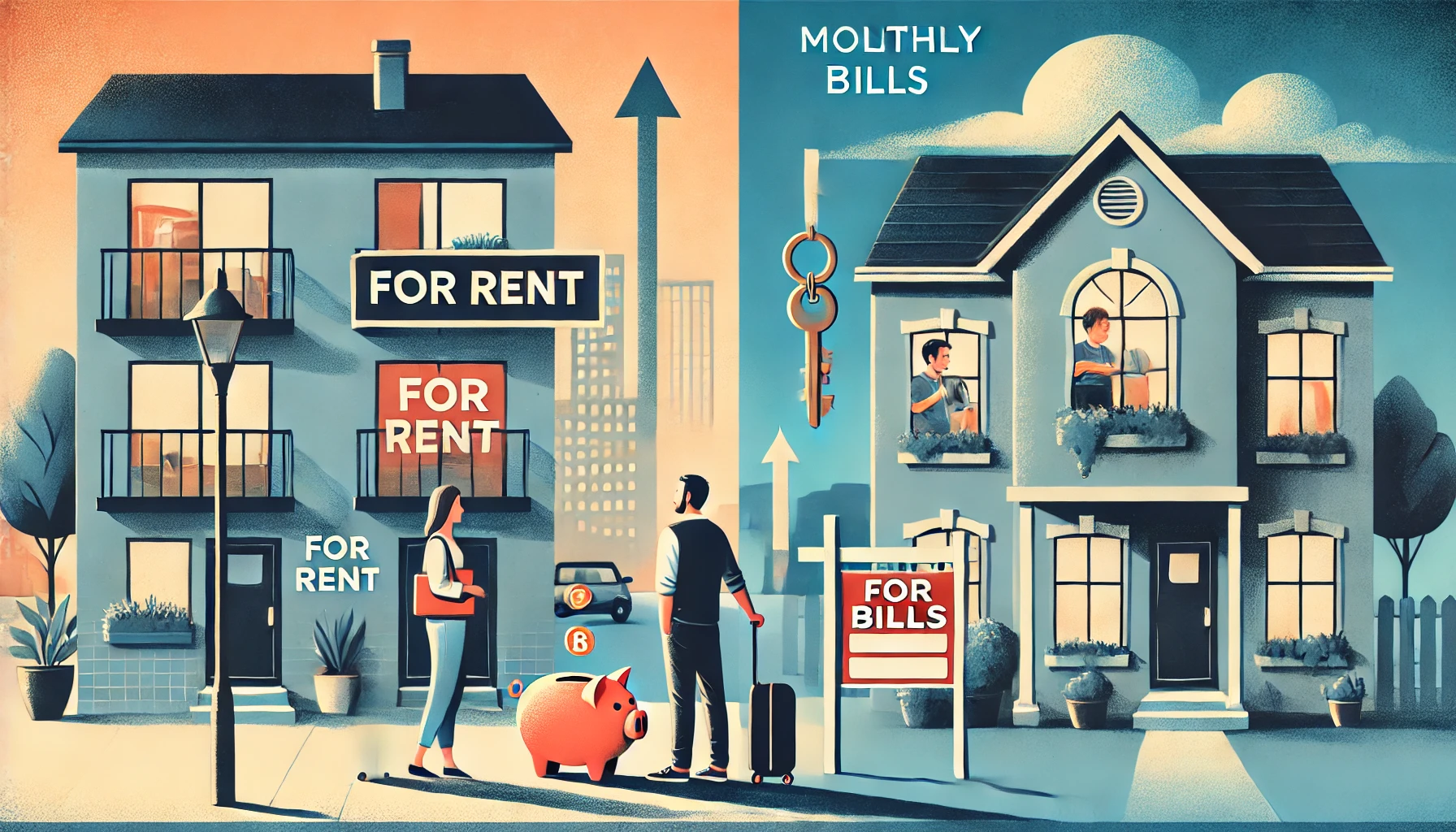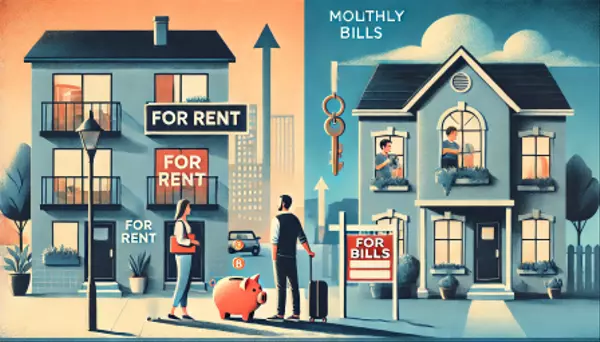Renting vs. Buying: Strategies to Save for a Down Payment and Cut Monthly Costs
by Scott Miller
Deciding whether to rent or buy a home is one of the biggest financial choices you'll face. Each path has its own set of pros and cons that can shape your financial future differently. If owning a home is your end goal, saving up for a down payment is a crucial step. Plus, knowing how to lower your monthly expenses and take advantage of refinancing when mortgage rates drop can make homeownership more affordable. Let's explore the differences between renting and buying and discuss how you can save money to achieve your dream of owning a home.
Renting vs. Buying: The Key Differences
At its core, renting offers more flexibility, while buying provides stability and the opportunity to build equity over time. When you rent, your payments go toward someone else's property. When you buy, you're investing in your own asset. However, owning a home isn't just about the mortgage—there are other factors like property taxes, maintenance, and insurance to consider.
- Renting: Offers the ability to move easily with fewer upfront costs.
- Buying: Allows you to build wealth through home appreciation and paying down your mortgage principal.
Advantages of Renting
-
Lower Initial Costs and Commitment
Renting usually requires just a security deposit and the first month's rent. Buying a home, on the other hand, demands a significant down payment, closing costs, and a long-term mortgage commitment.
-
Flexibility to Move
If your job changes or you decide to relocate, renting makes it easier to move without the hassle of selling a property.
-
No Responsibility for Repairs and Maintenance
As a renter, you can call your landlord when something breaks. Homeowners have to handle repairs themselves or pay someone to do it.
Advantages of Buying a Home
-
Building Equity
Each mortgage payment brings you one step closer to owning your home outright, building equity that can be a financial asset in the future.
-
Property Value Appreciation
Over time, real estate often increases in value, so your home could be worth more than what you originally paid.
-
Control Over Your Property
Homeownership gives you the freedom to renovate and decorate your space without needing permission from a landlord.
The Hidden Costs of Homeownership
Owning a home comes with additional expenses that can catch first-time buyers off guard:
- Property Taxes: These vary depending on your home's location and value.
- Homeowner's Insurance: Protects your investment from unexpected events like natural disasters or accidents.
- Maintenance: Regular upkeep and unexpected repairs can add up over time.
Being prepared for these costs can help you avoid financial surprises.
The Savings Challenge: Planning for a Down Payment
Saving for a down payment is often one of the biggest hurdles in buying a home. While it's common advice to save 20% of the home's value, some loan programs allow for lower down payments:
- FHA Loans: Require as little as 3.5% down.
- Conventional Loans: Sometimes available with 5% to 10% down.
Figuring out how much you need to save each month depends on your target home price and your timeline.
Effective Strategies to Save for a Down Payment
Saving up requires dedication, but these strategies can help:
- Open a Dedicated Savings Account: Keeping your down payment funds separate can reduce the temptation to spend them.
- Cut Unnecessary Expenses: Small savings add up—consider reducing dining out, canceling unused subscriptions, or finding cheaper alternatives.
- Earn Extra Income: Side gigs like freelancing, driving for rideshare apps, or selling items online can boost your savings.
Automating Your Savings
Making your savings automatic can help you stay on track:
- Set Up Automatic Transfers: Schedule regular transfers from your checking to your savings account after each paycheck.
- Use Savings Apps: Apps like Acorns or Digit can help you save spare change or small amounts without much effort.
- Create a Budget: Identify areas where you can cut back and redirect those funds toward your down payment.
How to Reduce Rent to Save More Each Month
Since rent is often a significant monthly expense, lowering it can free up funds for savings:
- Negotiate Your Rent: If you've been a good tenant, your landlord might be willing to lower your rent to keep you.
- Downsize or Share Your Space: Moving to a smaller place or getting a roommate can significantly cut your housing costs.
- Relocate to a More Affordable Area: If possible, consider moving to a neighborhood with lower rent.
Building Your Credit to Qualify for a Mortgage
A good credit score is essential for getting approved for a mortgage with favorable terms:
- Pay Bills on Time: Late payments can hurt your credit score.
- Reduce Your Debt: Lowering your debt improves your credit utilization ratio, which can boost your score.
- Monitor Your Credit Report: Check for errors or fraudulent activity that could affect your score and dispute them if necessary.
The Importance of Refinancing When Rates Drop
Interest rates fluctuate over time, and refinancing your mortgage when rates are lower can save you money:
- Lower Monthly Payments: A lower interest rate can reduce your monthly mortgage payment.
- Shorten Your Loan Term: You might choose to refinance into a shorter-term loan, helping you pay off your mortgage sooner.
Keep in mind that refinancing comes with its own costs, but the long-term savings can outweigh these expenses.
Budgeting for Closing Costs and Moving Expenses
Don't forget to budget for additional costs beyond the down payment:
- Closing Costs: Usually 2-5% of the home's price, covering fees like appraisals and title insurance.
- Moving Expenses: Costs for movers, truck rentals, and packing supplies can add up quickly.
- Setting Up Your New Home: Expenses for furniture, appliances, and utilities should also be considered.
Government Assistance and First-Time Homebuyer Programs
Various programs can help make homeownership more attainable:
- FHA Loans: Offer lower down payments and more flexible credit requirements.
- VA Loans: Provide no-down-payment loans for qualified veterans.
- First-Time Homebuyer Grants: Some states offer grants or assistance with down payments and closing costs.
Research what's available in your area to see how these programs can support your goals.
When Renting Makes More Financial Sense
Sometimes, renting is the smarter choice:
- Job Instability: If your employment situation is uncertain, renting offers flexibility.
- Housing Market Conditions: In some markets, renting may be more affordable than buying.
- Short-Term Plans: If you're not ready to settle down long-term, renting keeps your options open.
Final Thoughts: Balancing Renting, Saving, and Buying
Whether to rent or buy is a personal decision that depends on your financial situation, goals, and lifestyle. If buying a home is your goal, start saving early and look for ways to reduce your monthly expenses. Remember, refinancing can offer additional savings when the time is right. Both renting and buying have their advantages—choose the option that best aligns with your long-term plans.
FAQs
-
How much should I save for a down payment each month?
Aim to save 20% of the home's price, but loans like FHA options allow for smaller down payments. Use a savings calculator to determine your monthly goal based on your timeline.
-
Can I buy a home with less than 20% down?
Yes, many first-time buyers use loans that require as little as 3.5% to 10% down.
-
What are some tips for negotiating rent?
If you've been a reliable tenant, you might negotiate a lower rent or agree to a longer lease to lock in a better rate.
-
How does refinancing work?
Refinancing replaces your current mortgage with a new one, often at a lower interest rate, which can reduce your monthly payments or shorten your loan term.
-
Are there government programs to help with down payments?
Yes, options like FHA loans, VA loans, and first-time homebuyer grants can assist with down payments and closing costs.

Categories
Recent Posts










GET MORE INFORMATION

